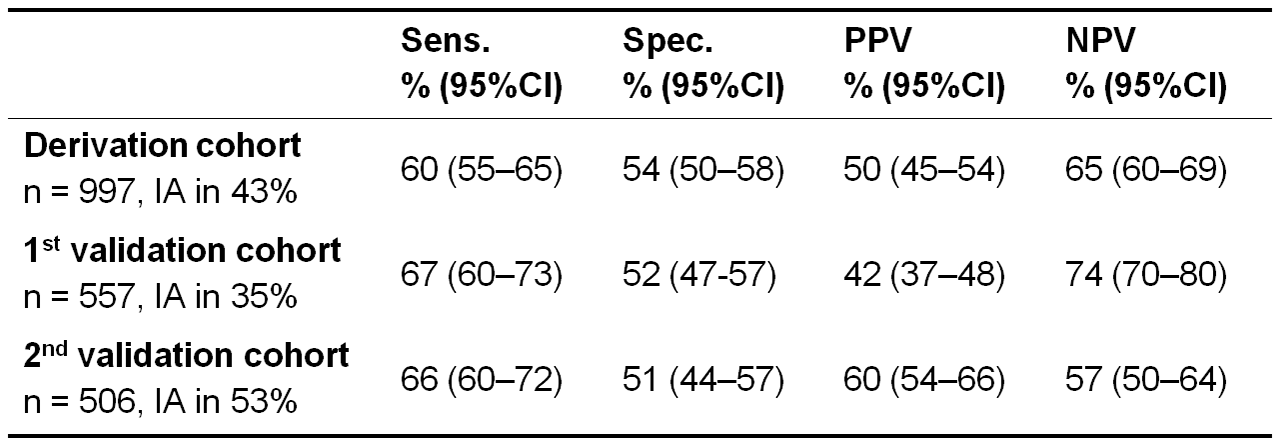Session Information
Date: Sunday, November 10, 2019
Title: RA – Diagnosis, Manifestations, & Outcomes Poster I: Risk Factors, Predictors, & Prognosis
Session Type: Poster Session (Sunday)
Session Time: 9:00AM-11:00AM
Background/Purpose: Early treatment initiation in RA is associated with improved outcomes but requires early identification of synovitis. Joint swelling in early inflammatory arthritis (IA) may be subtle, making it difficult to detect at joint palpation, especially for general practitioners (GPs) who have limited experience with this. To promote early recognition of IA, two Early Arthritis Recognition Clinics (EARC) were initiated in our country. EARCs are easy-access outpatient rheumatology clinics, intermediary between primary and secondary care, to which GPs can refer patients if in doubt about the presence of IA (instead of ‘watchful waiting’). Although this approach markedly reduced referral delay, it may not be easily implemented in other places. New tools are needed. Since it is unknown if inquiring about functional impairments is helpful in the early detection of IA, we used the unique EARC data of patients with suspected IA to investigate this. Aiming for simple and time-efficient use in daily practice, we evaluated whether a single question on functional impairments could aid the diagnosis of early IA.
Methods: From September 2010 to April 2014, 997 patients with suspected but uncertain IA visited one of the two EARCs and were included in a derivation cohort. In addition, 557 other patients visiting the same EARC (November 2015-December 2018) and 506 patients visiting another EARC (September 2010-January 2014) served as validation cohorts. IA was assessed by joint examination by rheumatologists, physical functioning with the Health Assessment Questionnaire Disability Index (HAQ-DI). Discriminative abilities of its 20 questions for IA were compared based on the area under the receiver operating characteristics curve (AUC) and test characteristics. Associations between the best discriminating question and IA were assessed with logistic regression. Odds ratios (ORs) were adjusted for age, sex and for six other, previously reported variables predictive of the presence of IA. Overall discriminative ability of multivariable logistic regression models was assessed with the AUC.
Results: IA was diagnosed in 43%, 35% and 53% of patients in the derivation and validation cohorts, respectively. In the derivation cohort, patients with IA had higher mean HAQ-DI-scores (0.84 compared to 0.73, p=0.003). Discriminative characteristics of one question on difficulties with dressing (AUC (95%CI) 0.57 (0.54–0.61); OR 1.83 (1.41-2.38)) paralleled the total HAQ-DI score (AUC 0.55 (0.52–0.59)). In the validation cohorts, ORs were 2.14 (1.48-3.10) and 2.00 (1.39-2.87) in univariable analyses, which remained similar in multivariable analyses. However, the difference in AUC for multivariable models with and without ‘difficulties with dressing’ was small: 0.73 (0.70–0.77) and 0.72 (0.69–0.76), respectively. Test characteristics are shown in the table.
Conclusion: A yes/no answer on a simple question (“Are you able to dress yourself, including shoelaces and buttons?”) was helpful in discriminating patients with and without IA. Findings were validated in independent 1.5-line settings and need to be validated further in primary care. This is a step forward to arrive at practical tools that are helpful for GPs in diagnosing IA.
To cite this abstract in AMA style:
van Dijk B, van Steenbergen H, Niemantsverdriet E, van der Helm-van Mil A. Can a Single Question on Functional Impairments Facilitate the Diagnosis of Early Inflammatory Arthritis? A Cross-Sectional Derivation and Validation Study in Two Early Arthritis Recognition Clinics [abstract]. Arthritis Rheumatol. 2019; 71 (suppl 10). https://acrabstracts.org/abstract/can-a-single-question-on-functional-impairments-facilitate-the-diagnosis-of-early-inflammatory-arthritis-a-cross-sectional-derivation-and-validation-study-in-two-early-arthritis-recognition-clinics/. Accessed .« Back to 2019 ACR/ARP Annual Meeting
ACR Meeting Abstracts - https://acrabstracts.org/abstract/can-a-single-question-on-functional-impairments-facilitate-the-diagnosis-of-early-inflammatory-arthritis-a-cross-sectional-derivation-and-validation-study-in-two-early-arthritis-recognition-clinics/

